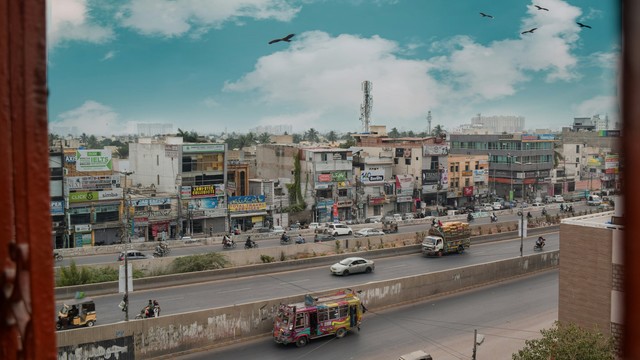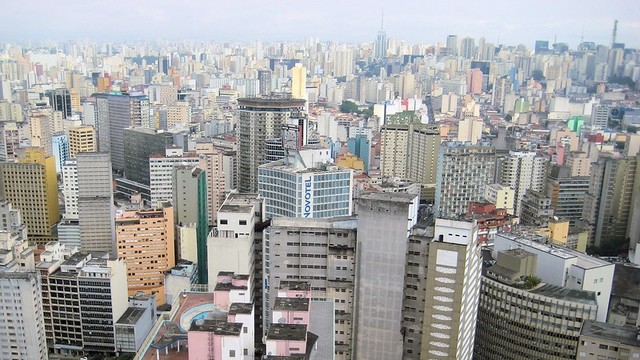Finance for whom and for what?
Ahead of the Financing for Development conference in Addis Ababa, David Satterthwaite highlights the disconnect that exists between the commitments made by national governments at international conferences and finance available for the (mostly local) institutions that can meet them.


A new sanitation block being constructed in Kibera settlement, Nairobi, Kenya. Most of Kibera's residents don't have access to electricity or running water (Photo: Sustainable Sanitation, Creative Commons via Flickr)
In mid-July, national government representatives will meet in Addis Ababa for the 3rd international conference on Financing for Development. A draft (PDF) for the Addis Ababa Accord (a global framework for financing sustainable development) is out.
If this was the first document you had read about future directions in development, you would be encouraged. It has the ambition to eradicate poverty and hunger, protect the environment (and preserve the planet for our children), promote peaceful and inclusive societies "where no-one is left behind". Ensure gender equality, promote and protect all human rights, including the right to development... And all this in the first paragraph!
There are also commitments to guarantee minimum levels of social protection and essential public services for all by 2030. All these commitments are made with a strong focus on national governments, international agencies and the private sector.
But who has to act – to change so fundamentally what is currently achieved? And to meet the Sustainable Development Goals (SDGs)?
What do they have to do and how should this be done? How will they be financed? By whom? Will this be accountable to those currently ill-served or unserved who have been left behind?
I want to explore this issue in relation to the four billion people living in urban centres, although much of what is said here applies to rural populations too.
So who needs finance to act, for example to ensure universal access to safe water? To treat the water (if needed), to put in the pipes that reach everyone (including those currently unserved), manage water flow so it's regular, provide households with a good service while keeping down costs (so the supply can be affordable), collect payments, maintain the system and expand it to cover all areas?
To find solutions for sanitation that serve low-income groups and that they can afford, measures to collect waste water and toilet wastes, dispose of them safely, measures to collect household waste, to put in all-weather roads and drains that work and that are maintained, to provide support for upgrading each informal settlement? And to ensure all the local actions, institutions and finance needed are in place?
And to ensure there is good healthcare and emergency services in each locality, social protection that reaches all those in need, schools and childcare (again for everyone), public transport, street lighting, policing in each locality, and so on?
Here for me is the biggest puzzle. There are so many goals that require effective, accountable and well-financed local institutions but no mention of these.
There is hardly any mention of local government or of the local organisations representing those ill-served or unserved – the 700 million urban dwellers who do not have water piped to their premises (and the much larger number lacking safe, regular water); the billion living in informal settlements – most of whom lack good quality sanitation, healthcare and schools.
At least for urban areas, these are the crucial actors. These are the local organisations that need finance. Yet the draft Addis Ababa Accord is all around national governments, international agencies and the private sector.
In paragraph 36, there is an acknowledgement of subnational governments and how they often lack adequate technical capacity, financing and support. So there is a commitment here to strengthen their capacity to invest and to implement "resilient infrastructure and climate-friendly policies and investments".
But where is the acknowledgement of their roles in development (including meeting all the needs noted above in service provision and in accountability to their population?) When the word community is used in this document, it seems to apply more to the international or global community than to local communities.
If we say it, will we do it?
On poverty, "We commit to ensure that all men and women, in particular the poor and vulnerable, have equal rights to economic resources as well as access to basic services, ownership and control over land and other forms of property, inheritance, natural resources, appropriate new technology and financial services including micro-finance" (paragraph 42).
But does this mean that 'the poor' really do have equal rights to economic resources, basic services and control of land?
The last 45 years have seen national governments gathering in dozens of global conferences organised by the United Nations, formally approving lots of commitments. For instance to universal provision for water and sanitation, healthcare, schools… This formal approval dates back 30 to 40 years, yet so few governments have fulfilled these commitments.
Does the fact that the word "sustainable" is used 116 times in the 22-page document give you confidence that it will be acted on? For much of the urban population, what is being sustained is their poverty and exclusion.
It is great to have a goal of full and productive employment and decent work for all, but how will this be achieved?
There are lots of commitments in this document ("we commit to…") but who are the "we" here? The same national governments who have mostly not fulfilled the commitments they have made over the last 40 years.
Far more attention is given in the draft document to the private sector than to local governments. Does the private sector really have more importance than local government and local civil society in universal provision of basic services and social protection? In leaving no one behind?
It is where local governments are elected, accountable, competent and with a strong financial base that a productive engagement with the private sector on sustainable development issues becomes possible.
Why doesn't the United Nations call for local governments to make commitments to meeting the Millennium Development Goals (MDGs) and the SDGs and to monitor progress? Meeting so many of the goals depends on them (and on their financing).
What we need is international finance institutions capable of supporting hundreds of thousands of locally defined initiatives, with investments from local governments and from local civil society organisations (especially in the urban context where these include organisations and federations of slum/shack dwellers).
We need finance institutions that are committed to setting the highest standards in local accountability as well as accountability to funders.
This is the issue that the Addis Ababa Accord should be addressing. If it did, perhaps there would be less of a gap between what was desired and what has been done so far – or is likely to be done by 2030.
David Satterthwaite (david.satterthwaite@iied.org) is a senior fellow in IIED's Human Settlements Group and leads the team on urban poverty and local organisations.



